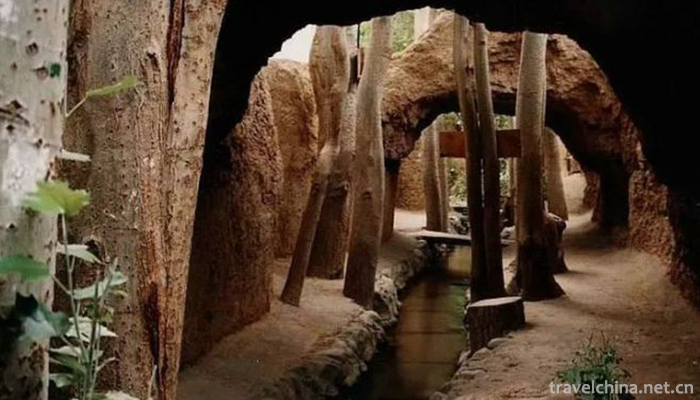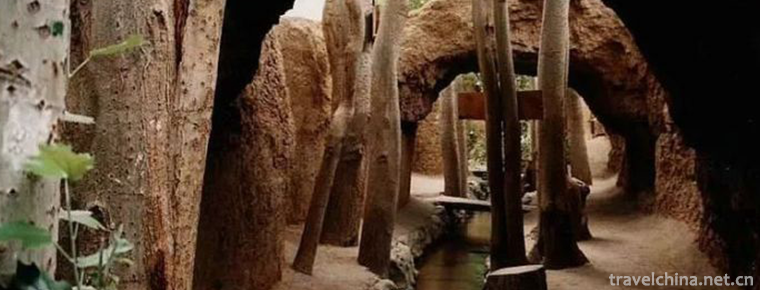Cutting Skill of Kaner Well
Cutting Skill of Kaner Well
Kanerjing is the meaning of "well hole". It has been recorded as early as in Historical Records. It is called "well canal", while Xinjiang Uygur language is called "Kanerzi". Kanerjing is a special irrigation system in desert areas, which is widely used in Turpan, Xinjiang, China. Kanerjing, together with the Great Wall and the Grand Canal of Beijing and Hangzhou, is known as the three major projects in ancient China. The total number of Kaner wells in Turpan is more than 1100, with a total length of about 5000 kilometers. On November 11, 2014, the drilling technique of Kanerjing was approved by the State Council and listed in the fourth batch of representative projects of national intangible cultural heritage.
brief introduction
Kanerjing, which means "well hole", is called "Kanerzi" in Xinjiang Uygur language. Kanerjing is a special irrigation system with ingenious structure in desert areas, especially in Turpan, Xinjiang. It is called the Three Great Projects of Ancient China with the Great Wall and the Grand Canal of Beijing and Hangzhou. The total number of Kaner wells in Turpan is more than 1100, with a total length of about 5000 kilometers.
2. Structural Principle
Kaner well is an ancient horizontal catchment structure for groundwater development and utilization. It is suitable for foothills and alluvial fan margins, mainly for intercepting underground diving for farmland irrigation and residential water use.
The structure of Kaner well is composed of four parts: vertical shaft, underground channel, surface channel and "waterlogging dam" (small reservoir). Bogda Mountain in the north of Turpan Basin and Karawucheng Mountain in the West are covered with snow and rainwater in spring and summer, which dive into the Gobi beach. By using the slope of the hill, people ingeniously created Kaner wells to divert underground subsurface flow to irrigate farmland. Kaner well does not evaporate a lot of water because of hot and strong wind, so the flow rate is stable and self-flow irrigation is guaranteed.
3 role
The reason why Kanerjing was built in large numbers in Turpan Basin is inseparable from the local physical and geographical conditions. Turpan is one of the extremely arid areas in China, with annual precipitation of only 16 mm and evaporation of up to 3000 mm, which can be called the "dry pole" of China. However, Kaner well is an underground underground canal water conveyance, not affected by season, wind and sand, small evaporation, stable flow, can be perennial self-flow irrigation.
It is precisely because of this unique underground water conservancy project, which leads the underground water to the ground and irrigates hundreds of thousands of mu of good fields in the basin, that the Turpan people of all nationalities were bred and the desert became an oasis.
On November 11, 2014, the drilling technique of Kanerjing was approved by the State Council and listed in the fourth batch of representative projects of national intangible cultural heritage.


-
1.Vegetable party
Vegetable party (alias Su Chunjuan) is one of the common local traditional snacks in Guiyang. It can be seen almost everywhere in the streets of Guiyang. This dish is crisp
Time 2018-11-05 -
2.Jinji Lake
Jinji Lake is located in the northeast of the old urban area of Suzhou City, Jiangsu Province, and in the middle of Suzhou Industrial Park
Time 2018-12-06 -
3.Beijing Museum of Natural History
The Beijing Museum of Natural History is located in the overpass area on the central axis of the capital's southern city. It is backed by the Tiantan Park, a world cultural heritage
Time 2018-12-15 -
4.Jiuhuangshan Ape King Cave Scenic Area
Jiuhuangshan Ape King Cave Scenic Area, located in Beichuan Qiang Autonomous County of Mianyang, Sichuan Province, is the largest karst cave in southwest China and a famous tourist cave in Western Chi
Time 2018-12-22 -
5.Baimaiquan Park
Baimaiquan Scenic Area, located at No. 2017 Huiquan Road, Zhangqiu District, Jinan City, Shandong Province, is located in the eastern part of Jinan City. Founded in 1986
Time 2019-01-02 -
6.Shanshan guild hall
Shanxi-Shaanxi Guild Hall is the place where Shanxi and Shaanxi merchants and businessmen associate with each other and worship gods. It combines exquisite architectural
Time 2019-02-08 -
7.Cai Luns Paper making Legend
Cailun Paper-making Stories and Legends are legends circulated in Cailun's fiefdoms, burial sites and experimental sites of Yangxian Longting and surrounding areas.
Time 2019-04-04 -
8.Production Techniques of Black Tea
Qimen Black Tea is the only black tea among the top ten famous teas in China. It is produced in Qimen County, Anhui Province. Tea production in Qimen has a long history, which can be
Time 2019-05-03 -
9.Shaoxing Pinghu Tune
Shaoxing Pinghu Diao, also known as "Yuejun Nanci", or "Shaoxing Pinghu Diao" for short, is a popular form of folk art in Shaoxing and its surrounding areas in Zhejiang Province. I
Time 2019-06-14 -
10.Xinjiang Uygur Mukam Art
Xinjiang Uygur Mukam Art is a large-scale integrated classical music art form which integrates singing, dancing and music. It is the general name of "Twelve Mukam" and "Daolang Mukam&qu
Time 2019-07-06 -
11.Xu Wenchangs Story
The story of Xu Wenchang takes the history of the middle and late Ming Dynasty as the background. From the legend story of Xu Wenchang's youth, "Taking things from the pole", it has been tol
Time 2019-07-09 -
12.Appreciation of short sleeve cheongsam
In the late summer and early autumn, the weather is chilly in the morning and evening. As long as you put on some thin shawls, you can wrap some cloth shawls and tighten them on your chest.
Time 2020-12-11